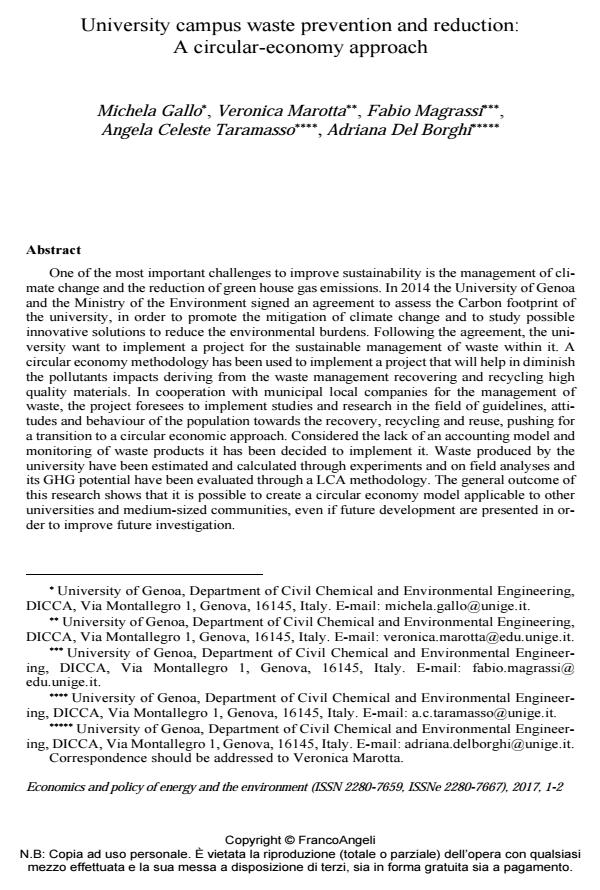University campus waste prevention and reduction: A circular-economy approach
Titolo Rivista ECONOMICS AND POLICY OF ENERGY AND THE ENVIRONMENT
Autori/Curatori Michela Gallo, Veronica Marotta, Fabio Magrassi, Angela Celeste Taramasso, Adriana Del Borghi
Anno di pubblicazione 2017 Fascicolo 2017/1-2
Lingua Inglese Numero pagine 18 P. 235-252 Dimensione file 249 KB
DOI 10.3280/EFE2017-001012
Il DOI è il codice a barre della proprietà intellettuale: per saperne di più
clicca qui
Qui sotto puoi vedere in anteprima la prima pagina di questo articolo.
Se questo articolo ti interessa, lo puoi acquistare (e scaricare in formato pdf) seguendo le facili indicazioni per acquistare il download credit. Acquista Download Credits per scaricare questo Articolo in formato PDF

FrancoAngeli è membro della Publishers International Linking Association, Inc (PILA)associazione indipendente e non profit per facilitare (attraverso i servizi tecnologici implementati da CrossRef.org) l’accesso degli studiosi ai contenuti digitali nelle pubblicazioni professionali e scientifiche
One of the most important challenges to improve sustainability is the management of climate change and the reduction of green house gas emissions. In 2014 the University of Genoa and the Ministry of the Environment signed an agreement to assess the Carbon foot-print of the university, in order to promote the mitigation of climate change and to study possible innovative solutions to reduce the environmental burdens. Following the agreement, the university want to implement a project for the sustainable management of waste within it. A circular economy methodology has been used to implement a project that will help in diminish the pollutants impacts deriving from the waste management recovering and recycling high quality materials. In cooperation with municipal local companies for the management of waste, the project foresees to implement studies and research in the field of guidelines, attitudes and behaviour of the population towards the recovery, recycling and reuse, pushing for a transition to a circular economic approach. Considered the lack of an accounting model and monitoring of waste products it has been decided to implement it. Waste produced by the university have been estimated and calculated through experiments and on field analyses and its GHG potential have been evaluated through a LCA methodology. The general outcome of this research shows that it is possible to create a circular economy model applicable to other universities and medium-sized communities, even if future development are presented in order to improve future investigation.
Parole chiave:Circular economy, university, research, waste management
Jel codes:Q53, L30, O3
- Key Performance Indicators for an Energy Community Based on Sustainable Technologies Giovanni Bianco, Barbara Bonvini, Stefano Bracco, Federico Delfino, Paola Laiolo, Giorgio Piazza, in Sustainability /2021 pp.8789
DOI: 10.3390/su13168789 - Evaluation of By-products’ Potentiality for the Reincorporation in New Building Materials D A Arellano Vázquez, L Moreschi, G J Islas Valverde, M Gallo, A Del Borghi, J C Arteaga Arcos, in IOP Conference Series: Earth and Environmental Science /2020 pp.012007
DOI: 10.1088/1755-1315/544/1/012007 - Carbon-Neutral-Campus Building: Design Versus Retrofitting of Two University Zero Energy Buildings in Europe and in the United States Adriana Del Borghi, Thomas Spiegelhalter, Luca Moreschi, Michela Gallo, in Sustainability /2021 pp.9023
DOI: 10.3390/su13169023 - Sustainable Business Change Nataša Petrović, Marko Ćirović, Flavio Pinheiro Martins, pp.3 (ISBN:978-3-031-23542-9)
- Sustainability in Maritime Sector: Waste Management Alternatives Evaluated in a Circular Carbon Economy Perspective Michela Gallo, Luca Moreschi, Michela Mazzoccoli, Veronica Marotta, Adriana Del Borghi, in Resources /2020 pp.41
DOI: 10.3390/resources9040041 - Circular economy approach to reduce water–energy–food nexus Adriana Del Borghi, Luca Moreschi, Michela Gallo, in Current Opinion in Environmental Science & Health /2020 pp.23
DOI: 10.1016/j.coesh.2019.10.002 - Addressing sustainability through waste management: a perspective from higher education institutions in Southeast Asia Hanney Binti Ramdan, Shahriar Shams, Monzur Alam Imteaz, Amimul Ahsan, Takashi Honda, in Journal of Material Cycles and Waste Management /2023 pp.873
DOI: 10.1007/s10163-022-01566-8 - Waste Management under Emergency Conditions: Life-Cycle Multicriteria Analysis as Decision Support System Luca Moreschi, Adriana Del Borghi, Angela Celeste Taramasso, Michela Gallo, in Resources /2020 pp.82
DOI: 10.3390/resources9070082 - Assessing environmental sustainability of local waste management policies in Italy from a circular economy perspective. An overview of existing tools Daniela Camana, Alessandro Manzardo, Sara Toniolo, Federico Gallo, Antonio Scipioni, in Sustainable Production and Consumption /2021 pp.613
DOI: 10.1016/j.spc.2021.01.029
Michela Gallo, Veronica Marotta, Fabio Magrassi, Angela Celeste Taramasso, Adriana Del Borghi, University campus waste prevention and reduction: A circular-economy approach in "ECONOMICS AND POLICY OF ENERGY AND THE ENVIRONMENT" 1-2/2017, pp 235-252, DOI: 10.3280/EFE2017-001012